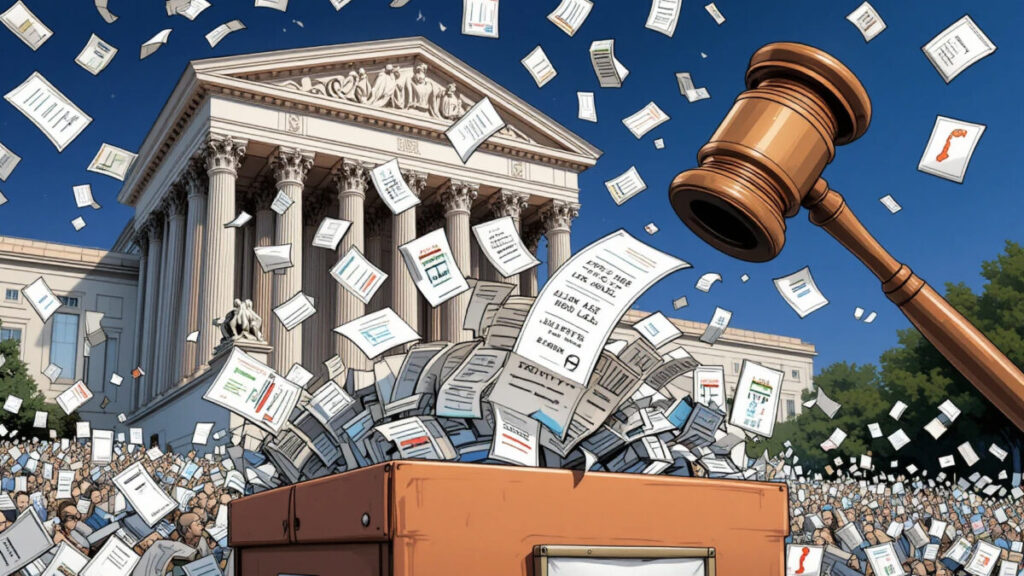By Lori Lee
NDG Contributing Writer
The Voting Rights Act was put in place to protect citizens from voter discrimination.
Nonetheless, the Supreme Court’s ruling in Robinson v. Callais makes following that law a slippery slope considering the new notion that section II of the Voting Rights Act violates the 14th Amendment Equal Protection clause.
The Louisiana case was brought by a group identifying themselves as non-African-American voters who claimed the new district’s odd shape was a racial gerrymander, violating the equal protection rights clause. This, after a federal judge found the state out of compliance with the Voting Rights Act, ordering a new Black majority district.
Now, the high court favoring the plaintiffs, has ruled the majority Black district, which Justice Gorsuch likened to a snake crossing the state, had focused too much on race, PBS reports.

The March 24 decision defies the court’s very own precedent set just two years ago in Allen v. Milligan, which required Alabama draw a second Black majority district to avoid diluting Black political power.
The flipped decision is stunning considering it was made by the very same court and the very same justices as the Milligan case.
Are these wishy-washy decisions based on politics? Yes, according to the Brennan Center for Justice, which reported the current House majority rests on a shaky foundation of manipulated, gerrymandered maps, encouraged by the Supreme Court.
The high court has said the district was drawn based solely on race, noted NAACP voting rights attorney Victoria Wenger in a March American Community Media briefing. But this motivation was undergirded by a court order directing the state to consider race,
Voter dilution occurs where voters are packed into districts, rather than dispersing their influence, said Wenger. After celebrating the long-denied opportunity for Black voters to disperse their power, the legislature was also able to accomplish its political goals, added Wenger.
The group’s original, more strait laced map could have hurt Republican House representatives Julia Letlow and Mike Johnson, NPR reported. So the state legislature offered a compromise, which protected the Republican majority and according to Wenger, displaced Garrett Graves, a rival of the governor.
Under the clause, a district cannot be drawn to prioritize race while foregoing other principles or criteria, Wenger explained, “whether that’s the shape of the district, the logic of it, the communities it represents, or politics.”
Yet, in decades of doctrine, the Supreme Court has easily found ways to balance race considerations, she said, and legislatures have prioritized race with good reason to comply with the Voting Rights Act.
It’s about principles of legislative sovereignty and how we balance constitutional and statutory precedent, she said.
The new map balanced multiple considerations, she said, including various court rulings and politics.
“The citizens of Louisiana were really clear from the very beginning that they wanted fair maps and they wanted the ability to elect candidates of choice,” added Ashley Shelton, founder, president and CEO of Power Coalition for Equity and Justice.
Across the state, Louisiana has had unprecedented participation in legislative hearings and redistricting.
Here we are 60 years after the Voting Rights Act passed, and those rights are once again at stake. Civil rights leader Alanah Odoms recently joined in a march across the Edmund Pettus Bridge for the 60th anniversary of Bloody Sunday.
“Thousands more gathered with us from around the nation, she said, Black, White, Asian, Hispanic, Christian, Muslim, Jewish, each of us feeling the weight of history beneath our feet.”
The group carried signs and banners demanding their voting rights, said Odoms.
“It was impossible not to feel the energy of those who came before us, the foot soldiers, the civil rights activists, the ordinary people who put their bodies on the line for something bigger than themselves.”
Sixty years later, we are still fighting, still litigating because while some things have changed, the struggle for voting rights is not over.
“Louisiana’s history is a painful reflection of this truth,” said Odoms. From Jim Crow laws and constitutional trickery that wiped Black voters from the rolls, to literacy tests and poll taxes, the Black vote has always been suppressed.
“Voting is about dignity. It is about power. It is about whether we are seen,” added Odoms.
Sixty years ago, they marched and bled, and they litigated, and the Voting Rights Act became law.
But the law alone is not enough, she said.
“We have seen voting rights gutted. We have seen maps manipulated. We have seen democracy shrink before our eyes.
“And so we have to keep marching. We have to keep pushing. We have to keep litigating.”
“We cannot forget what history has taught us–That justice only comes when we make it come, that power concedes nothing without a demand.”




